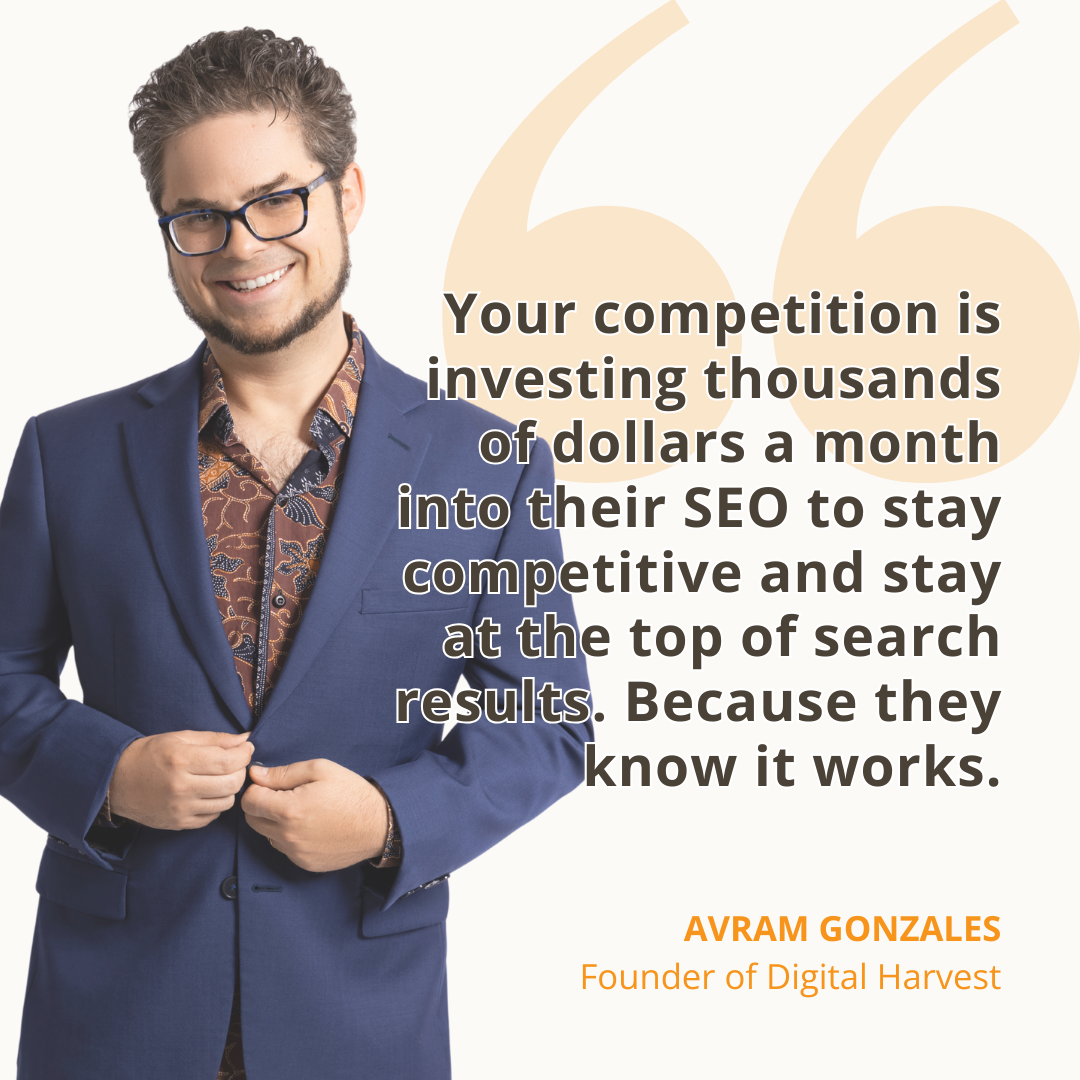SEO vs Social Media: Which Is Better for Lead Generation?
Where should local businesses put their money first—SEO or social media? It’s a question that almost every home services professional asks as they plan to grow their customer base.
Here’s my straightforward answer as the founder and CEO of Digital Harvest, an SEO agency specializing in local businesses: For most local businesses, SEO wins every time. And it’s not just opinion. It’s about resource management, measurable ROI, and proven results.
By the end of this post, you’ll know exactly why SEO should be your first marketing priority and when social media might be worth considering. Most importantly, you’ll walk away with clear steps to make the right decision for your specific business.
SEO vs Social Media for Lead Generation: What’s the Difference?
To choose the right strategy, you first need to understand the core difference between SEO and social media marketing.

SEO = Pull Marketing
Search Engine Optimization (SEO) focuses on bringing customers to you. It’s pull marketing. People are actively searching for a solution to their problem. Whether it’s “roof repair near me” or “HVAC maintenance tips,” SEO aligns your business with their intent to buy or consult.
Here’s why it works:
- SEO connects you with high-intent customers.
- It’s hyper-local. For home service businesses, it targets the exact geographic area you operate in.
"SEO targets customers who are actively looking for a solution. This means that when you put energy into your SEO, it's going directly to the people who want to buy your stuff." — Avram Gonzales, CEO of Digital Harvest

Social Media = Push Marketing
Social media, on the other hand, is push marketing. Your content interrupts a person’s scrolling, aiming to grab attention and pique interest. The audience might not even be considering making a purchase or booking a service.
- Social posts often reach broader audiences, many of whom aren’t local or relevant to your business.
- The intent to buy is far lower among casual scrollers than active Google searchers.
- While social media can deliver visibility and engagement, those metrics don’t necessarily translate into instant leads or closed deals.
Understanding these contrasting approaches is key to positioning your marketing budget where it will make the biggest impact.
Why SEO Is the #1 Lead Source for Most Local Service Businesses
For most local service providers, SEO is a match made in marketing heaven. Why? Because people turn to Google the moment they’re ready to solve a problem. And home services are often urgent, high-need searches.
Perfect Fit for High-Intent Searches
Think about it. If someone has a burst pipe, they’re Googling, “plumber near me.” If a roof is leaking, it’s “roofing repair in [City Name].” They’re not searching social media for these emergencies.
Here’s why SEO works:
- SEO leads are easier to close. If someone searches for your specific service, they already know what they need. All that’s left is connecting them with your business.
- It drives revenue faster. Targeting high-intent searches leads to faster conversions compared to social media efforts that take time to build trust and visibility.

Industry Examples
SEO is particularly effective (and essential) for specific home service industries:
- Plumbers
- HVAC companies
- Roofing contractors
- Locksmiths
- Restoration experts
These businesses don’t benefit from scrolling traffic. What they need is immediate, local visibility online.
"Your competition is investing thousands of dollars a month into their SEO to stay competitive and stay at the top of search results. Because they know it works." — Avram Gonzales
When Social Media Does Make Sense for Lead Generation
That said, social media isn’t entirely without value. Specific industries can thrive off a social-first approach.
A Visual Industry Advantage
For industries reliant on visuals, personality, and trust-building, social media delivers a unique edge. Think about:
- Salons and barbershops showcasing before-and-after photos of haircuts.
- Boutique retailers or e-commerce businesses using product demos.
- Interior designers, who inspire with visually stunning home transformations.
With social proof and engaging content, these industries can attract customers who want to connect with the creativity behind the brand.
Example social media strategies include:
- Sharing videos of transformations (e.g., before-and-after cuts, home redesigns).
- Highlighting personality and expertise through Instagram Stories or TikToks.
- Using live workshops or Q&A sessions to directly engage customers.
For these businesses, social media becomes a creative playground to establish relationships and credibility.
Why Most Local Businesses Shouldn’t Rely on Social Media for Leads
For local service businesses (like HVAC, plumbing, or roofing), social media often fails to deliver measurable results.
The Issue with Social Media for Service Pros
- Most prospects aren’t seeking local service providers while scrolling Instagram or Facebook.
- Branding campaigns take time to see results. You may need 6–9 months for consistent visibility to turn into even a single lead.
- Content creation can lead to burnout with minimal ROI for the time invested.
"Branding doesn't make your phone ring—at least not for a long time." — Avram Gonzales
Instead of generating immediate leads, social media is better suited for raising brand awareness. And when time, resources, and marketing budgets are limited, that’s a luxury most small, local businesses just can’t afford upfront.
Start with SEO, Add Social Later: The Smart Approach
Here’s my winning strategy for most local businesses:
- Start with SEO: SEO is your foundation and the fastest way to generate predictable lead flow. It’s resource-efficient and measurable, giving you clear data about what works.
- Layer on Social Media: Once you’ve established a steady lead pipeline through SEO, you can diversify into social media. Use it as a complementary branding and engagement tool, but only once you have the revenue to invest.
- Focus on ROI: SEO gives you immediate returns in visibility, traffic, and leads. Social media builds long-term brand equity, but it’s not the best starting place for industries that rely on speed and volume to meet business goals.
By following this approach, you can build a strong, sustainable marketing strategy that prioritizes immediate results while laying the groundwork for long-term growth.
SEO vs Social Media: Which Channel Should You Prioritize?
The final takeaway? It all comes down to resource management.
- If you’re in a home service industry (like plumbing, roofing, or HVAC), SEO should be your priority.
- For visual or brand-driven sectors like salons or retail, social media has more potential.
Want to make sure your SEO strategy delivers real results? Work with Digital Harvest or connect with Avram Gonzales on LinkedIn to drive local leads and measurable growth. We'd love to help you start generating leads and results that matter.
